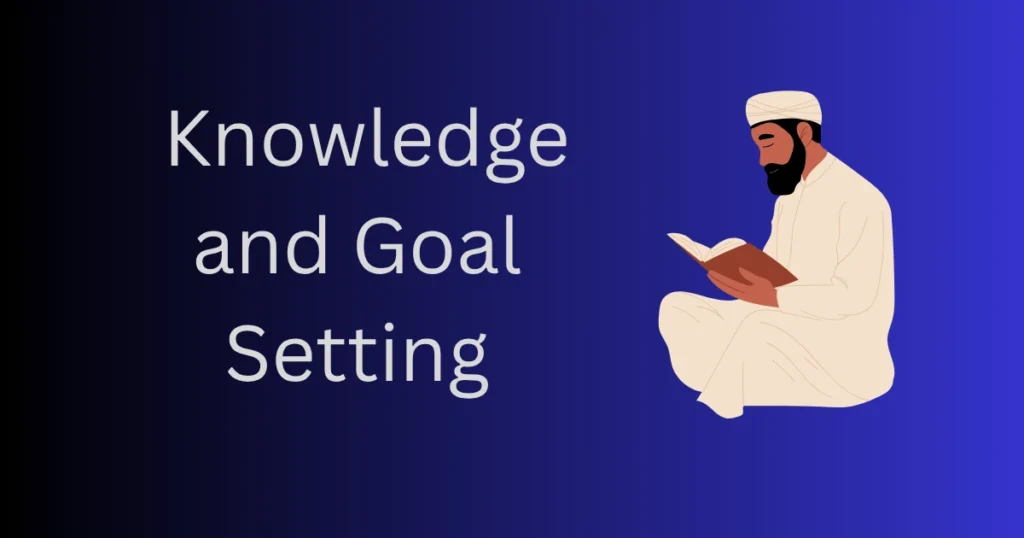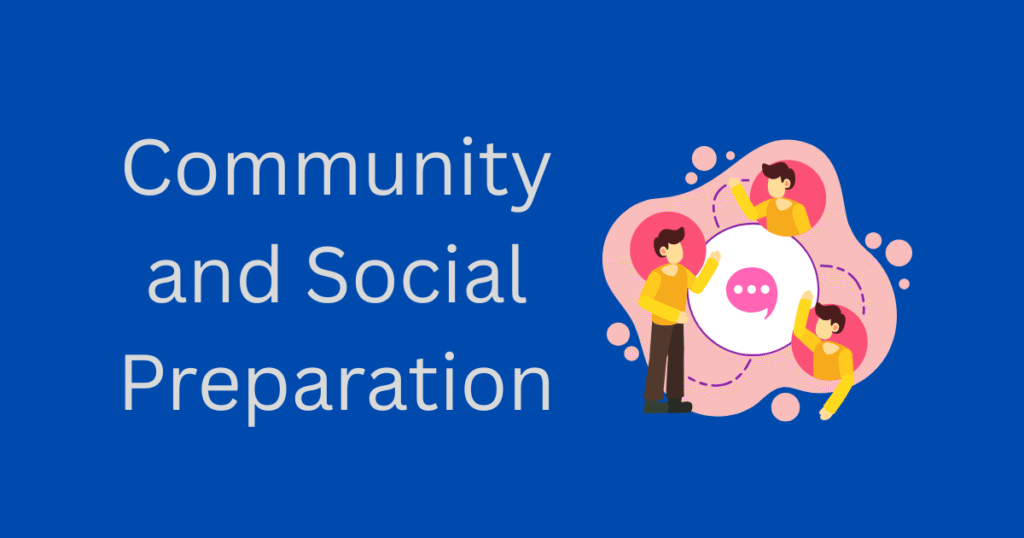40 Days Before Ramadan – Step-by-Step Guide To Understanding The 40 Days Before Ramadan Rules
🌙 40 Days Before Ramadan – Summery
Begin preparing for Ramadan 2026 forty days early to enter the month with peace, strength, and focus. Build your spiritual foundation through daily Qur’an, Tahajjud, and sincere Tawbah. Strengthen your body with voluntary fasts, less caffeine, and better sleep. Plan wisely — calculate Zakat, organize meals, and set realistic worship goals. Prepare your family and resolve conflicts to welcome Ramadan with unity. Arrange community iftars and anticipate the last ten nights and Laylat al-Qadr with devotion. Early preparation brings ease, deeper connection, and lasting transformation. Start today — progress with sincerity, not perfection.
| Online Free Zakat Calculator | Ramadan Countdown Tool |
| Chand Ki Tarikh (Islamic Date Today) | Islamic Profit Sharing Calculator |
| Istikhara Dua | Islamic Marriage Compatibility Checker |
40 Days Before Ramadan: Your Complete 2026 Preparation Guide (Start Today!)
Table of Contents
🌙 Why Smart Muslims Start Preparing 40 Days Before Ramadan
يَـٰٓأَيُّهَا ٱلَّذِينَ ءَامَنُوا۟ كُتِبَ عَلَيْكُمُ ٱلصِّيَامُ كَمَا كُتِبَ عَلَى ٱلَّذِينَ مِن قَبْلِكُمْ لَعَلَّكُمْ تَتَّقُونَ

“O you who believe! Fasting is prescribed for you as it was prescribed for those before you, that you may become righteous.” (Surah Al-Baqarah, 2:183)
Here’s something I’ve learned after helping thousands of Muslims prepare for 40 Days Before Ramadan over the past decade: the most transformative Ramadan experiences don’t start on the first day of fasting—they begin 40 days earlier.
Think about it. Would you run a marathon without training? Would you climb a mountain without preparing your gear? Ramadan is a spiritual marathon, and the Muslims who get the most out of it are those who train their hearts, minds, and bodies in advance.
The Sacred Number 40 in Islamic History
The number 40 holds deep Meaning in Islam:
- Prophet Musa (AS) spent 40 days on Mount Sinai receiving divine guidance from Allah
- Prophet Muhammad (SAW) regularly retreated to Cave Hira for periods of contemplation before receiving his first revelation at age 40
- Islamic scholars have recognized for centuries that meaningful transformation requires consistent preparation over time
After years of observation, I’ve seen this pattern repeatedly: Muslims who prepare 40 days early experience deeper spiritual connections, smoother physical transitions to fasting, better organized routines, and more peaceful homes during Ramadan.
This isn’t about achieving perfection—it’s about making progress. Small, consistent changes starting 40 days before Ramadan create lasting habits that enhance your entire blessed month experience.
Let’s walk through this Guide together, step by step. 🌟
📅 Your 40-Day Ramadan Preparation Timeline at a Glance
| Week | Focus Area | Daily Actions | Success Milestone |
|---|---|---|---|
| Week 1-2 (Days 40-26) | Spiritual Foundation | Start 5-min Quran reading, begin Tahajjud 2x/week, daily Tawbah routine | Consistent 15-minute daily spiritual practice |
| Week 3-4 (Days 25-11) | Physical Preparation | Practice voluntary fasts (Mon/Thu), adjust sleep schedule by 15 min weekly, reduce caffeine | Comfortable with 2 fasts per week, no withdrawal headaches |
| Week 5-6 (Days 10-4) | Knowledge & Planning | Learn fasting rules, calculate Zakat, plan Iftar/Suhoor meals, set clear goals | Complete understanding of Ramadan fiqh + written goal sheet |
| Final Week (Days 3-1) | Final Preparations | Stock groceries, prep frozen meals, organize prayer space, family discussions | Ready for Ramadan Day 1 with zero stress |
🎯 Pro Tip: Print this timeline and stick it on your fridge. Check off each milestone as you complete it!
🕌 Part 1: Building Your Spiritual Foundation (Weeks 1-2)
1. Start Your Daily Quran Connection NOW
شَهْرُ رَمَضَانَ ٱلَّذِىٓ أُنزِلَ فِيهِ ٱلْقُرْءَانُ هُدًۭى لِّلنَّاسِ

“The month of Ramadan in which was revealed the Quran, a guidance for mankind.” (Surah Al-Baqarah, 2:185)
The Quran and Ramadan are inseparable. Yet here’s what I hear every year: “I wanted to finish the Quran during Ramadan, but I just couldn’t keep up.”
The secret? Don’t wait until Ramadan to build this habit.
Your 5-Minute Daily Quran Routine (Start Today!)
✅ Pick ONE consistent time: After Fajr prayer, during your lunch break, or before bed
✅ Start small: Just one page with translation
✅ Use modern tools: Download apps like Quran Majeed, Al-Quran (Greentech), or Tarteel AI
✅ Understand what you read: Always read translation alongside Arabic—this transforms ritual into relationship
✅ Set phone reminders: But aim to make it automatic within 2 weeks
Real Example: Amina, a busy marketing executive, reads one page during her morning coffee. By the time Ramadan arrives, she’s reading 3-4 pages effortlessly. That’s the power of gradual preparation!
By starting now, you’ll have momentum when Ramadan begins. Reading larger portions will feel natural, not forced. The spiritual rewards compound beautifully. 📖✨
2. Make Peace with Allah Through Daily Tawbah (Repentance)
The Prophet Muhammad (SAW) said:
“All the children of Adam are sinners, but the best of sinners are those who repent often.” (Sunan At-Tirmidhi, 2499)
Ramadan is called the month of forgiveness—but why wait until then to seek Allah’s mercy?
Your Nightly Tawbah Ritual (10 Minutes)
🌙 Find a quiet spot after Isha prayer
🌙 Face the Qiblah and sit comfortably
🌙 Speak from your heart—don’t just mechanically say “Astaghfirullah”
🌙 Reflect on specific actions you regret today
🌙 Make genuine commitments to change
This isn’t about perfection—it’s about purification. Think of repentance as cleaning a mirror. The cleaner it is, the more clearly it reflects light. When you enter Ramadan with a heart already softened by repentance, you become more receptive to the month’s blessings.
Make It Practical
Write down 2-3 main areas for personal improvement:
- Instead of vague “be a better person,” try: “Count to ten before responding when frustrated”
- Instead of “be more patient,” try: “Take three deep breaths before reacting to traffic”
- Instead of “stop gossiping,” try: “Redirect conversations away from others’ faults”
Specific goals create lasting change. 🤲
3. Build the Beautiful Habit of Tahajjud Prayer
وَإِذَا سَأَلَكَ عِبَادِى عَنِّى فَإِنِّى قَرِيبٌ ۖ أُجِيبُ دَعْوَةَ ٱلدَّاعِ إِذَا دَعَانِ
“And when My servants ask you concerning Me, indeed I am near. I respond to the invocation of the supplicant when he calls upon Me.” (Surah Al-Baqarah, 2:186)
Here’s Ramadan’s hidden treasure that most people overlook: Tahajjud prayer.
While everyone focuses on Taraweeh, the real spiritual magic happens in the quiet hours before Fajr. The Prophet (SAW) said:
“Our Lord descends to the lowest heaven during the last third of every night and says: ‘Who is calling upon Me that I may answer him? Who is asking from Me that I may give him? Who is seeking My forgiveness that I may forgive him?'” (Sahih Al-Bukhari, 1145)
Your Tahajjud Starter Plan
🌟 Week 1-2: Wake up just 15 minutes before your usual Fajr time
🌟 Perform fresh wudu (this helps wake you up naturally)
🌟 Pray just 2 rak’ahs—focus on quality, not quantity
🌟 Make sincere dua in your own words
🌟 Don’t worry about lengthy recitations—sincerity matters most
Some nights you’ll feel deeply connected. Other nights might feel routine. Both are normal and beneficial.
The beauty of starting now? By Ramadan, waking early won’t feel like torture. Your body adjusts. Your soul begins to crave those precious quiet moments with Allah.
Create Your Prayer Space
Set up a comfortable corner in your home:
- Clean, beautiful prayer rug
- Your Quran and tasbeeh beads
- Soft lighting (avoid harsh overhead lights)
- Perhaps a small table for your Islamic books
Having a designated spot makes the practice feel special and helps establish the routine faster. 🌟
🍽️ Part 2: Physical Preparation for Fasting (Weeks 3-4)

4. Master Voluntary Fasting Before Ramadan Begins
Jumping into 30 days of consecutive fasting without training is like running a marathon without practice. Your body needs time to adjust to the new eating schedule, hydration patterns, and energy rhythms.
The Prophet Muhammad (SAW) regularly fasted outside of Ramadan, especially on Mondays and Thursdays. He said:
“Deeds are presented to Allah on Mondays and Thursdays, so I love for my deeds to be presented while I am fasting.” (Sunan At-Tirmidhi, 747)
Your Voluntary Fasting Training Schedule
| Week | Fasting Days | Focus |
|---|---|---|
| Week 3 | 1 day (Monday) | Observe your hunger patterns and energy dips |
| Week 4 | 2 days (Mon + Thu) | Practice Suhoor timing and Iftar portions |
| Week 5 | 2-3 days | Fine-tune your meal choices and hydration |
What to Learn During Practice Fasts
🔍 When do you feel most hungry? (Usually 2-3pm for most people)
🔍 What helps maintain energy? (Protein-rich Suhoor? Dates at Iftar?)
🔍 How does your mood change? (Irritable? Focused? Spiritual?)
🔍 What activities drain you most? (Plan accordingly for Ramadan)
Important: Don’t just focus on avoiding food and drink. Practice controlling your tongue, eyes, and thoughts during voluntary fasts. This holistic approach—what scholars call “fasting of the limbs”—prepares you for Ramadan’s deeper spiritual dimensions.
The Prophet (SAW) said:
“Whoever does not give up lying and evil actions, then Allah is not in need of their leaving food and drink.” (Sahih Al-Bukhari, 1903)
Remember: Fasting isn’t just about hunger—it’s about consciousness of Allah (Taqwa). 🌙
5. Gradually Adjust Your Sleep Schedule
Ramadan completely transforms your daily rhythm:
- 🌅 Suhoor before dawn (around 4-5 AM)
- 😴 Potential afternoon fatigue from fasting
- 🕌 Late-night Taraweeh prayers (9-11 PM)
- 🌙 Possible Tahajjud in the last third of the night
Starting your sleep adjustment 40 days early prevents the exhaustion crash that many Muslims experience during Ramadan’s first week.
Your Gradual Sleep Transition Plan
📊 Current bedtime: Let’s say 12:00 AM
📊 Week 3: Shift to 11:45 PM (15 minutes earlier)
📊 Week 4: Shift to 11:30 PM
📊 Week 5: Shift to 11:15 PM
📊 Week 6: Target 11:00 PM or earlier
This gradual approach allows your circadian rhythm to adjust naturally without shocking your system.
Practice Your Ramadan Morning Routine
Even if you’re not fasting yet:
- Wake up 30 minutes before Fajr
- Eat something light (simulate Suhoor)
- Perform wudu
- Use remaining time for Quran or dhikr
- Pray Fajr on time
Family Tip: If you have young children, start adjusting their schedules too. Discuss Ramadan preparations with your spouse so you can support each other’s routine changes.
Quality sleep during Ramadan isn’t selfish—it helps you worship better and maintain good character throughout fasting hours. 😊
6. Plan Nutritious Suhoor and Iftar Meals
Food becomes incredibly important during Ramadan—but not in the way you might think. It’s not about elaborate feasts. It’s about fueling your body wisely for worship and daily activities.
Poor meal planning leads to:
- ❌ Severe fatigue
- ❌ Dehydration headaches
- ❌ Decreased spiritual focus
- ❌ Irritability and mood swings
The Perfect Suhoor Formula
The Prophet Muhammad (SAW) said:
“Take Suhoor, for there is blessing in it.” (Sahih Al-Bukhari, 1923)
Focus on slow-releasing energy:
| Food Category | Best Choices | Why |
|---|---|---|
| Complex Carbs | Oatmeal, whole grain bread, brown rice | Sustained energy release throughout the day |
| Protein | Eggs, Greek yogurt, cheese, beans | Keeps you fuller longer, prevents muscle loss |
| Healthy Fats | Avocado, nuts, nut butter, olive oil | Slow digestion, steady energy |
| Hydration | Water, herbal tea, coconut water | Prevents dehydration (avoid caffeine!) |
| Natural Sugars | Dates, bananas, berries | Quick energy + fiber |
❌ Avoid at Suhoor:
- Sugary cereals (cause energy crashes)
- Very salty foods (increase thirst)
- Spicy foods (can cause acid reflux)
- Excessive caffeine (leads to dehydration)
The Sunnah Iftar Method
The Prophet (SAW) would break his fast with:
- Fresh dates (3-7 dates)
- Water
- Then pray Maghrib
- Then return for the main meal
Modern nutritionists confirm this wisdom:
- Dates provide instant natural sugars for quick energy
- Water rehydrates efficiently without shocking your stomach
- Praying before the big meal prevents overeating
Sample Iftar Meal Structure
🥗 Start light:
- Dates + water
- Light soup or salad
- Pray Maghrib
🍽️ Main meal (30-45 min after breaking fast):
- Lean protein (grilled chicken, fish, lentils)
- Complex carbs (brown rice, quinoa, whole wheat)
- Lots of colorful vegetables
- Healthy fats (olive oil, avocado)
🍉 Hydration throughout evening:
- Water consistently (not all at once!)
- Herbal teas
- Fresh fruit with high water content
Start Experimenting Now
This week, try making these types of meals. Find combinations that:
- ✅ Satisfy your family’s preferences
- ✅ Fit your cooking skill level
- ✅ Work with your budget
- ✅ Can be prepared quickly
Meal Prep Tip: Prepare and freeze some meals in advance. Ramadan isn’t the time for complicated cooking experiments! 🍽️
🧠 Part 3: Knowledge and Goal Setting (Weeks 5-6)

7. Learn the Complete Fiqh (Rules) of Fasting
Many Muslims have fasted for years but still have questions about what’s permissible and what isn’t. Uncertainty creates anxiety and can affect your spiritual experience.
Now is the perfect time to clarify these rules with authentic Islamic sources.
What BREAKS Your Fast?
✖️ Intentionally eating or drinking
✖️ Intentional vomiting
✖️ Sexual relations during fasting hours
✖️ Intentional ejaculation
✖️ Menstruation or post-childbirth bleeding
✖️ Medicine through certain routes (injections for nutrition, not treatment)
What DOESN’T Break Your Fast
✅ Accidentally eating or drinking (if you genuinely forgot)
✅ Brushing teeth (avoid swallowing toothpaste)
✅ Showering or swimming (don’t swallow water intentionally)
✅ Using perfume or applying makeup
✅ Giving blood (according to most scholars)
✅ Tasting food while cooking (without swallowing)
✅ Medical injections for treatment (like insulin – consult scholar if unsure)
Special Cases and Allowances
Allah says in the Quran:
“But whoever is ill or on a journey, then an equal number of other days. Allah intends for you ease and does not intend for you hardship.” (Surah Al-Baqarah, 2:185)
Who can break the fast and make it up later?
- Travelers on long journeys
- People who are sick (even with minor illness that worsens with fasting)
- Pregnant women if fasting harms them or the baby
- Nursing mothers if fasting affects milk supply
- Women menstruating or in postpartum bleeding
Who can pay Fidya (feeding the poor) instead?
- Elderly people who cannot fast
- People with chronic illnesses that prevent fasting permanently
- Fidya amount: Feeding one poor person per missed day (approximately the cost of two meals)
Where to Learn More
📚 Reliable sources:
- Your local mosque imam or Islamic scholar
- Books by Ibn Rajab (Lataaif Al-Ma’aarif)
- Books by Ibn Qayyim (Zad Al-Ma’ad)
- Authentic hadith collections (Bukhari, Muslim, Tirmidhi)
- Trusted websites: SeekersGuidance.org, IslamQA.info, FiqhCouncil.org
⚠️ Avoid: Random social media fatwas or unverified advice
When you understand the rules clearly, you can focus on the spiritual aspects of fasting rather than worrying about technical details. This knowledge also helps you guide family members and friends who might have similar questions. 📚
8. Understand the WISDOM Behind Fasting
Ramadan isn’t just about following rules—it’s about understanding the beautiful wisdom behind these practices. When you comprehend the “why” behind the “what,” your worship transforms from obligation to inspiration.
Why We Fast: The Deeper Purposes
🌟 Spiritual Development
- Strengthens Taqwa (God-consciousness)
- Breaks attachment to material pleasures
- Increases gratitude for Allah’s blessings
- Enhances self-control and discipline
🌟 Social Benefits
- Builds empathy for the hungry and poor
- Strengthens community bonds through group Iftar
- Encourages increased charity and compassion
- Promotes equality (rich and poor fast together)
🌟 Physical Benefits
- Gives digestive system a rest
- May improve metabolism and mental clarity
- Detoxifies the body naturally
- Teaches mindful eating habits
🌟 Psychological Benefits
- Develops willpower and patience
- Reduces stress through increased prayer
- Creates sense of accomplishment
- Promotes mindfulness and presence
The pre-dawn meal (Suhoor) creates quiet time for reflection. Breaking fast together (Iftar) builds family and community bonds. Night prayers (Taraweeh) provide additional spiritual connection. Even the physical benefits reflect the perfection of Islamic guidance.
Share This Wisdom
This knowledge helps you:
- Explain Ramadan to non-Muslim colleagues and neighbors
- Motivate yourself during difficult fasting moments
- Teach children the significance (not just the rules)
- Represent Islam beautifully and authentically
When you see Ramadan as holistic spiritual training—not just “can’t eat or drink”—your entire experience deepens. 🌟
9. Set Clear, Achievable Ramadan Goals
Vague intentions lead to vague results. Instead of hoping to “be more spiritual” during Ramadan, let’s create specific, measurable goals aligned with Islamic teachings and your personal growth needs.
The SMART Goals Framework for Ramadan
Specific | Measurable | Achievable | Relevant | Time-bound
Sample Ramadan Goals by Category
📿 Spiritual Goals
- ✅ Complete the entire Quran (1 juz daily using Ramadan schedule)
- ✅ Memorize Surah Al-Mulk (2 verses per day)
- ✅ Make istighfar 100 times daily (use Ramadan dua counter app)
- ✅ Attend all 30 Taraweeh prayers at the mosque
- ✅ Wake for Tahajjud 20 out of 30 nights
- ✅ Make dua for 10 specific things after each prayer
💰 Financial Goals
- ✅ Donate $5 daily to rotating charities ($150 total)
- ✅ Calculate and pay Zakat by Ramadan 15th
- ✅ Sponsor Iftar for mosque community once
- ✅ Support 3 different Islamic causes
💪 Physical Goals
- ✅ Maintain healthy Suhoor/Iftar portions (no overeating)
- ✅ Walk 15 minutes after Iftar daily
- ✅ Sleep minimum 6 hours per night following Ramadan routine
- ✅ Stay hydrated (8 glasses water between Iftar-Suhoor)
❤️ Character Development
- ✅ Zero gossip for entire month
- ✅ Speak kindly to family 100% of time
- ✅ Respond to anger with silence (count to 10 first)
- ✅ Thank someone daily (in person or message)
- ✅ Forgive one person who wronged you
The Prophet (SAW) said:
“Whoever does not give up lying and acting upon lies, then Allah is not in need of their leaving food and drink.” (Sahih Al-Bukhari, 1903)
Your Personal Ramadan Action Sheet
Create a simple document with:
- Top 3 priorities (most important goals)
- Daily habits checklist for your Ramadan routine
- Weekly review questions
- Accountability partner (spouse, friend, or family member)
Example Daily Ramadan Checklist:
☐ Fajr on time
☐ 1 juz Quran
☐ 100 istighfar
☐ Healthy Suhoor/Iftar
☐ No gossip today
☐ Taraweeh attended
☐ Daily sadaqah given
☐ Gratitude list (3 things)
Review your Ramadan goals weekly. Adjust if needed—flexibility is part of wisdom. Remember, Allah looks at your sincere efforts, not just outcomes. 🎯
💰 Part 4: Financial and Social Preparation (Week 5)

10. Calculate and Plan Your Zakat Distribution
Zakat is one of Islam’s five pillars—a non-negotiable obligation for every Muslim who meets the nisab threshold. Many Muslims choose to pay during Ramadan when rewards are multiplied.
Don’t wait until Ramadan to calculate! Use these 40 days to carefully assess your financial obligations and create a thoughtful distribution plan.
What Counts Toward Zakat? (Zakatable Assets)
✅ Cash savings (bank accounts, cash at home)
✅ Gold and silver (including jewelry in some schools of thought)
✅ Business inventory and goods
✅ Stocks, bonds, and investment accounts
✅ Money owed to you (that you expect to receive)
✅ Rental income properties (some scholars)
❌ Not included:
Personal home, car for personal use, furniture, clothing, food
How to Calculate Zakat
Nisab threshold: Equivalent to 85 grams of gold OR 595 grams of silver
Zakat amount: 2.5% of your zakatable wealth held for one lunar year
Formula:
Total Zakatable Assets × 0.025 = Your Zakat
Example:
$10,000 in savings + $3,000 in gold = $13,000 total
$13,000 × 0.025 = $325 Zakat due
🔗 Helpful Tool: Use an online Zakat calculator (Islamic Relief, Muslim Aid, or your local mosque website)
Who Qualifies to Receive Zakat?
Allah specifies eight categories in the Quran (Surah At-Tawbah, 9:60):
- The poor (al-fuqara)
- The needy (al-masakin)
- Zakat administrators
- Those whose hearts are being reconciled (new Muslims)
- Those in bondage (freeing slaves, modern interpretation: human trafficking victims)
- The debt-ridden
- In the cause of Allah
- The traveler (stranded)
Smart Zakat Distribution Strategy
Consider diversifying your Zakat using this Islamic fasting guide approach:
| Category | Percentage | Example |
|---|---|---|
| Local families in need | 40% | Mosque recommendations, neighbors |
| International relief | 30% | Syria, Palestine, Yemen relief orgs |
| Islamic education | 20% | Madrasa, Quran school, scholarship funds |
| Emergency relief | 10% | Disaster response, refugee support |
Trusted Organizations:
Islamic Relief, Muslim Aid, Human Appeal, Penny Appeal, your local mosque’s Zakat fund, verified individual cases
Important: Always verify the organization is reputable and uses funds appropriately. Ask for accountability reports.
Zakat isn’t just fulfilling an obligation—it’s purifying your wealth and supporting the Ummah. 💝
11. Plan Extra Charity (Sadaqah) Throughout Ramadan
Beyond obligatory Zakat, Ramadan is the ultimate season for voluntary charity. The Prophet Muhammad (SAW) was always generous, but during Ramadan? He was extraordinary.
Ibn Abbas (RA) said:
“The Prophet was the most generous of people, and he was even more generous during Ramadan… He was more generous than the rushing wind.” (Sahih Al-Bukhari, 6)
Create Your Daily Sadaqah Budget
Even small amounts create massive impact:
💵 $1 per day = $30 for the month
💵 $2 per day = $60 for the month
💵 $5 per day = $150 for the month
Can’t afford much? The Prophet (SAW) said:
“Protect yourself from the Fire even with half a date (in charity).” (Sahih Al-Bukhari, 1417)
Types of Sadaqah (Beyond Money)
🤲 Physical charity:
- Volunteer at food banks
- Help elderly neighbors with groceries
- Teach Quran to children
- Visit the sick
- Prepare food for hospital staff or first responders
🗣️ Social charity:
- Spread Islamic knowledge
- Give sincere advice
- Make dua for others
- Reconcile between people in conflict
- Speak kind words
💪 Character charity:
- Smile at someone (yes, it’s Sadaqah!)
- Remove harmful objects from pathways
- Help someone carry heavy items
- Water a plant or feed an animal
- Be patient with difficult people
The Prophet (SAW) said:
“Every act of goodness is charity.” (Sahih Muslim, 1005)
Family Sadaqah Projects for Ramadan Preparation
Involve your whole family:
- 👨👩👧👦 Adopt a family for the month (provide weekly groceries)
- 👨👩👧👦 Create “Ramadan Blessing Bags” for homeless (water, dates, snacks)
- 👨👩👧👦 Sponsor Iftar meals at the mosque together
- 👨👩👧👦 Collect children’s toys to donate
- 👨👩👧👦 Write thank-you notes to community helpers
This teaches children generosity while creating beautiful family memories.
Track Your Giving: Keep a simple log (for tax purposes and personal reflection on Allah’s blessings). 📝
12. Prepare Your Home and Strengthen Family Relationships
Ramadan is intensely communal. You’ll likely host or attend more gatherings, spend extra time with family, and welcome guests for Iftar. Preparing your home environment and strengthening relationships NOW prevents stress and conflicts during the holy month.
Home Preparation Checklist
🏠 Physical Space:
- ✅ Deep clean kitchen and dining areas
- ✅ Organize pantry and freezer
- ✅ Create a dedicated prayer space
- ✅ Decorate with Ramadan decorations (crescents, lights, banners)
- ✅ Stock up on dates, basic groceries, disposable items
- ✅ Prepare and freeze 3-5 meals in advance
🛒 Ramadan Checklist – Shopping List Essentials:
- Dates (multiple varieties)
- Whole grains (rice, oats, quinoa)
- Proteins (chicken, fish, lentils, beans)
- Fresh/frozen vegetables
- Healthy snacks (nuts, dried fruits)
- Hydration items (coconut water, herbal teas)
- Disposable plates/cups (for unexpected guests)
Family Conversation Starters for Ramadan Preparation
Sit down with your family before Ramadan and discuss:
💬 Questions to ask:
- What are everyone’s personal Ramadan goals?
- Who wants to fast? (Age-appropriate for children)
- Which nights should we prioritize for Taraweeh together?
- How many Iftar gatherings should we host?
- What meal preferences does everyone have?
- How can we support each other during difficult moments?
- Should we create a “no-devices” time during Iftar?
For teenagers: Ask about their plans for balancing school, social pressures, and fasting. Some teens prefer fasting quietly at school; others enjoy explaining their practices to friends. Respect their approach.
Resolve Conflicts NOW
The Prophet Muhammad (SAW) said:
“It is not permissible for a Muslim to desert his brother beyond three days.” (Sahih Al-Bukhari, 6077)
Ramadan’s spiritual benefits are greatly diminished when you’re harboring anger or resentment.
Action steps:
- Make a list of any strained relationships
- Reach out with sincere intentions to mend them
- Approach with humility—focus on moving forward, not rehashing the past
- For serious conflicts, involve a trusted mediator
Even if your efforts aren’t immediately reciprocated, you’ll enter Ramadan with a clear conscience and an open heart ready to receive Allah’s blessings. 💚
🏃♂️ Part 5: Health and Wellness (Week 6)

13. Gradually Reduce Caffeine and Unhealthy Habits
One of the most common complaints I hear every Ramadan? “I had terrible headaches the first few days.”
Usually, the culprit is sudden caffeine withdrawal. If you’re a regular coffee, tea, or energy drink consumer, start reducing NOW to avoid this painful distraction from worship.
Your Caffeine Reduction Plan
| Week | Current Intake | Reduction Goal | Replacement Strategy |
|---|---|---|---|
| Week 4 | 4 cups daily | Reduce to 3 cups | Replace 1 cup with herbal tea |
| Week 5 | 3 cups daily | Reduce to 2 cups | Replace with water + lemon |
| Week 6 | 2 cups daily | Reduce to 1 cup | Morning only, herbal tea afternoon |
| Ramadan Week 1 | 1 cup or less | Minimal/zero | Hydrate well at Suhoor |
Pro tip: Green tea has less caffeine than coffee—use it as a stepping stone!
Replace Bad Habits with Good Ones
This gradual approach works for any habit you want to change during Ramadan:
🚭 Smoking: Reduce gradually while increasing dhikr and seeking Allah’s help
📱 Excessive social media: Start time limits now (30 min less per week)
📺 Too much Netflix: Replace with Islamic lectures or Quran recitation
🍔 Junk food: Swap one unhealthy meal per day with nutritious options
Remember: The goal isn’t just temporary change for Ramadan—it’s permanent lifestyle improvement. When you break habits gradually while building spiritual strength, positive changes become lasting.
This aligns with the Quranic principle of gradual change. Even alcohol prohibition in Islam was revealed in stages, not all at once—showing Allah’s wisdom and mercy. ☕
14. Build Physical Stamina for Extended Worship
Ramadan involves more physical activity than your typical month:
- 🕌 Longer prayer sessions (Taraweeh can be 1-2 hours)
- 🌅 Early morning Suhoor preparation
- 🏃 Maintaining work and family responsibilities while fasting
- 🌙 Late nights for special prayers (Laylat al-Qadr)
Building your physical stamina NOW helps you participate fully without exhaustion.
Your Ramadan Fitness Prep Plan
✅ Gentle exercises you can maintain during Ramadan:
🚶 Walking following Ramadan routine:
- Start with 20 minutes daily
- Best time: After Iftar (aids digestion!)
- Bring family along for quality time
- Listen to Quran recitation while walking
🧘 Stretching:
- Morning stretches (5-10 minutes)
- Focus on back, legs, and neck
- Helps with longer prayer sessions
- Reduces muscle tension from Sujood
🙏 Prayer posture practice:
- Focus on proper form during Sujood and Ruku
- Strengthen legs for standing (Qiyam)
- Consider a prayer cushion if you have joint issues
- Islam allows chairs or sitting—don’t hurt yourself!
❌ Avoid during Ramadan prep:
- High-intensity workouts you can’t maintain while fasting
- Starting brand new intense exercise routines
- Anything that causes excessive thirst
Remember: Islam provides accommodations for physical limitations. If you have health issues, use whatever helps you worship comfortably!
Hydration Strategy (Critical for Muslim Fasting Guide!)
Many headaches during Ramadan come from dehydration, not hunger.
Smart hydration plan:
- 💧 Drink 2 glasses at Iftar (slowly)
- 💧 2 glasses during evening (not all at once)
- 💧 2 glasses at Suhoor timing
- 💧 1-2 glasses before sleeping
Total: 7-8 glasses between Iftar and Suhoor
🥤 Best choices: Plain water, coconut water, herbal teas
❌ Avoid: Excessive caffeine, sugary drinks (cause dehydration)
Food-based hydration: Include water-rich foods like cucumbers, watermelon, lettuce, tomatoes, and oranges in your Ramadan meal plan.
Quality sleep + proper hydration = Better worship and mood! 💪
15. Create a Health-Conscious Ramadan Meal Plan
Here’s an uncomfortable truth: Many Muslims GAIN weight during Ramadan due to overeating at Iftar and choosing nutrient-poor foods.
But Ramadan isn’t about feasting—it’s about fasting with wisdom. Food should be fuel for worship, not the focus of your day.
The Golden Rules of Ramadan Eating
1. Break your fast like the Prophet (SAW) – Breaking Fast Ritual:
- 3-7 dates
- Water
- Pray Maghrib first
- Then eat your meal 20-30 minutes later
Why this works: Prevents blood sugar spikes, aids digestion, and stops overeating!
2. Follow the 1/3 rule:
The Prophet (SAW) said:
“A human being fills no worse vessel than his stomach. It is sufficient for a human being to eat a few mouthfuls to keep his spine straight. But if he must (fill his stomach), then one third for food, one third for drink, and one third for air.” (Sunan Ibn Majah, 3349)
3. Eat mindfully and slowly:
- Chew thoroughly
- Put fork down between bites
- Engage in conversation
- Stop eating when 80% full
Sample Healthy Ramadan Meal Plans
🌙 SUHOOR OPTIONS (Pre-Dawn Meal) – Sahur Timing Ideas
Option 1: Protein Power Bowl
- Greek yogurt with berries and almonds
- 2 boiled eggs
- Whole grain toast with avocado
- Dates (2-3)
- Water + herbal tea
Option 2: Overnight Oats
- Oats soaked with milk, chia seeds, banana
- Tablespoon peanut butter
- Handful of walnuts
- Water
Option 3: Savory Breakfast
- Scrambled eggs with spinach and tomatoes
- Whole wheat pita
- Hummus and cucumbers
- Dates
- Water
🌅 IFTAR OPTIONS (Breaking Fast) – Complete Ramadan Meal Plan
Starter (all iftars):
- 3-5 dates
- Water or fresh juice
- Pray Maghrib
Main Meal Option 1: Mediterranean Style
- Lentil soup
- Grilled chicken with roasted vegetables
- Quinoa or brown rice
- Mixed green salad with olive oil
- Fresh fruit
Main Meal Option 2: Traditional Comfort
- Vegetable soup
- Baked fish with herbs
- Sweet potato
- Steamed broccoli and carrots
- Dates and nuts for dessert
Main Meal Option 3: Quick & Easy
- Chickpea curry with vegetables
- Brown basmati rice
- Cucumber raita (yogurt)
- Fresh fruit salad
Batch Cooking Strategy for Ramadan Health Tips
Prepare these NOW and freeze:
- ✅ Soups (lentil, vegetable, chicken)
- ✅ Marinaded proteins (chicken, fish portions)
- ✅ Cut vegetables in portions
- ✅ Pre-made curry bases
- ✅ Homemade granola for Suhoor
Label everything with:
- Dish name
- Date prepared
- Reheating instructions
This saves you 2-3 hours per week during Ramadan!
🔗 Recipe Resource Idea: Link to “10 Easy Ramadan Recipes You Can Freeze” 🥗
🤲 Part 6: Community and Social Preparation (Week 6)

16. Plan Meaningful Community Iftar Gatherings
The Prophet Muhammad (SAW) said:
“Whoever feeds a fasting person will have a reward like that of the fasting person, without any reduction in his reward.” (Sunan At-Tirmidhi, 807)
Community Iftar gatherings are among Ramadan’s most beautiful traditions—but they require thoughtful planning to be meaningful rather than stressful.
Your Iftar Hosting Strategy
🎯 Quality over quantity: Host 1-2 meaningful gatherings rather than exhausting yourself with weekly events.
📅 Coordinate with others:
- Talk to neighbors about a rotation system
- Each family hosts one Iftar
- Shares workload and expenses
- Builds stronger community bonds
🍽️ Simple menu planning:
- Focus on 2-3 dishes done well
- Potluck style (everyone brings something)
- Prep as much as possible beforehand
- Use disposable plates for easier cleanup
Guest List Ideas
Mix different groups:
- ✅ Muslim friends and family (strengthen bonds)
- ✅ New Muslims or converts (make them feel welcome)
- ✅ Non-Muslim neighbors and colleagues (beautiful dawah opportunity!)
- ✅ International students (who may be away from family)
- ✅ Single parents or elderly (who might be alone)
Inviting non-Muslims: This creates authentic opportunities for sharing Islam through hospitality and example. Many people are curious about Ramadan but never have chances to experience it firsthand.
What to explain to non-Muslim guests:
- Why Muslims fast (briefly)
- The timing of breaking fast (Maghrib call)
- Significance of dates and water
- The concept of gratitude and community
Keep it simple and natural—let your warm hospitality speak volumes! 🤝
Beyond Food: Meaningful Activities
Don’t let Iftar gatherings be ONLY about eating:
💭 Connection activities:
- Share what everyone is grateful for today
- Discuss one thing learned from Quran recently
- Group dhikr or brief dua after eating
- Storytelling about the Prophet (SAW) for children
- Simply enjoy meaningful conversations
Remember: The goal is strengthening relationships and creating positive memories associated with Islamic community life.
🔗 Resource Idea: Link to “Iftar Invitation Template” or “Community Iftar Planning Checklist”
17. Resolve Conflicts and Heal Broken Relationships
The Prophet (SAW) said:
“It is not permissible for a Muslim to desert his brother beyond three days.” (Sahih Al-Bukhari, 6077)
And in another narration:
“The doors of Paradise are opened on Monday and Thursday, and every servant who does not associate anything with Allah is forgiven, except for the man who has a grudge against his brother. It is said: ‘Delay these two until they reconcile.'” (Sahih Muslim, 2565)
Powerful truth: Ramadan’s spiritual benefits are greatly diminished when you’re harboring anger, resentment, or unresolved conflicts.
Your Relationship Healing Checklist
Step 1: Self-reflection
Make a honest list:
- 📝 Family members you’ve argued with
- 📝 Friends you’ve grown distant from
- 📝 Colleagues you’ve had misunderstandings with
- 📝 Anyone you’ve wronged
- 📝 Anyone who’s wronged you (that you haven’t forgiven)
Step 2: Assess each situation
For each relationship, ask:
- Was I at fault? (Even partially?)
- Can I take the first step to reconcile?
- What would reconciliation look like?
- Is my ego preventing peace?
Step 3: Take action
🕊️ Reach out with sincere intentions:
- Sometimes a simple text message is enough
- “As-salamu alaykum, I’ve been thinking about you. Can we talk?”
- Focus on moving forward, not rehashing past grievances
- Approach with humility—admit any mistakes on your part
- Even if they’re 90% wrong, acknowledge your 10%
🕊️ For serious conflicts:
- Involve a trusted mutual friend or family member as mediator
- Islamic tradition emphasizes reconciliation (Islah) as worship
- Remember: Forgiving brings tremendous rewards
The beautiful hadith:
“Shall I not inform you of something more excellent than fasting, prayer, and charity? Making peace between people.” (Sunan Abu Dawud, 4919)
Don’t Wait for Others
Take initiative to repair relationships—this demonstrates:
- Islamic character and maturity
- Trust in Allah’s justice
- Prioritizing spiritual wellbeing over ego
Even if your efforts aren’t immediately reciprocated, you’ll enter Ramadan with a clear conscience and peaceful heart—ready to receive Allah’s blessings fully.
Allah says:
“And let them pardon and overlook. Would you not love for Allah to forgive you? And Allah is Forgiving and Merciful.” (Surah An-Nur, 24:22)
💚 Make peace with others so Allah makes peace with you.
18. Prepare Children for Meaningful Ramadan Participation
Children’s Ramadan experiences shape their lifelong relationship with Islam. Whether your kids are old enough to fast or just beginning to understand Islamic practices, thoughtful preparation helps them participate meaningfully.
Age-Appropriate Ramadan Participation
👶 Ages 4-7: Introduction to Ramadan
Focus on positive associations with the blessed month:
- 🌙 Create a Ramadan countdown calendar
- 🌙 Decorate the house together (crescents, stars, lights)
- 🌙 Read age-appropriate Islamic storybooks
- 🌙 Simple crafts (paper lanterns, Ramadan banners)
- 🌙 Involve them in charity (collect toys to donate)
- 🌙 Teach them “Ramadan Mubarak” and basic concepts
Don’t expect them to fast—just build excitement and understanding!
🧒 Ages 8-11: Practice Fasting
Introduce partial fasting gradually:
- Start with fasting until noon (skip breakfast only)
- Progress to mid-afternoon fasting
- Some days full fast, some days partial
- Always make it their choice, not forced
- Celebrate their efforts enthusiastically!
Include them in:
- Helping prepare Suhoor and Iftar
- Attending Taraweeh (even if just first few rak’ahs)
- Reading simple Quran portions with translation
- Writing out their own Ramadan goals
👦 Ages 12+: Full Participation
Teenagers can fast fully but may need extra support:
Discuss openly:
- Their personal Ramadan goals
- Balancing school, social life, and fasting
- How to handle questions from non-Muslim friends
- Whether they prefer fasting publicly or privately at school
- Managing energy for sports or activities
Avoid:
- Being overly strict or critical
- Comparing them to other kids
- Forcing perfection
- Making Ramadan feel burdensome
Create Special Family Ramadan Traditions
💫 Make lasting positive memories:
- Special Ramadan bedtime stories every night
- Post-Iftar family walks together
- Learning one new short surah as a family
- “Ramadan blessings jar” (write daily gratitudes)
- Special weekend Suhoor traditions (pancakes, special foods)
- Ramadan craft nights
- Family charity projects together
These positive associations often influence children’s attitudes toward religion throughout their lives.
Goal: Nurture love for Islam, not create stress or negative associations.
The Prophet (SAW) was always gentle with children, understanding their nature and limitations. Follow his example! 👨👩👧👦
🎯 Part 7: Final Week Preparation (Days 7-1)

19. Create Your Personal Ramadan Action Plan
With just one week left, it’s time to consolidate all your preparation into a clear, actionable plan. This isn’t about perfection—it’s about having realistic structure that supports your spiritual goals.
Your Ramadan Dashboard Template
📋 TOP 3 RAMADAN PRIORITIES
(Example: Complete Quran, Improve family relationships, Increase charity)
📊 DAILY HABITS TRACKER FOR RAMADAN ROUTINE
Create a simple checklist:
🌅 MORNING
☐ Suhoor eaten before Fajr (follow proper Sahur timing)
☐ Fajr prayer on time
☐ Morning Quran reading (__ pages)
☀️ DAYTIME
☐ Dhikr during commute/breaks (use Ramadan dua app)
☐ Dhuhr prayer on time
☐ Asr prayer on time
☐ Afternoon Quran reading
🌙 EVENING
☐ Broke fast with dates + water (breaking fast ritual)
☐ Maghrib prayer on time
☐ Healthy Iftar portions (follow Ramadan meal plan)
☐ Taraweeh prayer attended/prayed
☐ Evening Quran reading
🌃 NIGHT
☐ Isha prayer on time
☐ Evening dhikr/reflection
☐ Tahajjud (when possible)
☐ Daily gratitude list
💪 WEEKLY GOALS – Ramadan Schedule
Set realistic weekly milestones:
- Week 1: Adjust to fasting routine
- Week 2: Establish consistent Quran schedule
- Week 3: Increase acts of charity and kindness
- Week 4: Focus on Laylat al-Qadr nights (maximize worship)
🤝 ACCOUNTABILITY PARTNER
Share your goals with:
- Spouse
- Close friend
- Family member
- Online Ramadan accountability group
Check in weekly: What’s working? What needs adjustment?
Build in Flexibility for Your Ramadan Routine
Remember: Life happens during Ramadan too!
- Work deadlines
- Family obligations
- Unexpected travel
- Illness or fatigue
- Children’s needs
Have backup plans:
- What if you’re traveling? (Make up fasts later)
- Super busy day at work? (Shorter Quran portions, longer later)
- Feeling sick? (Prioritize obligatory prayers, rest as needed)
- Guests arrive unexpectedly? (Adjust evening schedule gracefully)
Islam emphasizes balance and avoiding extremes. Allah wants ease for you, not hardship!
🔗 Resource: Download our “Ramadan Checklist – Daily Tracker Printable” 📋
20. Stock Your Home and Finalize Logistics
The final week is perfect for handling practical details that could become distractions during Ramadan. A well-organized home supports your spiritual focus!
🛒 Final Ramadan Checklist – Shopping List
Pantry Staples:
- ✅ Dates (buy variety: Medjool, Ajwa, regular)
- ✅ Rice, pasta, grains (brown rice, quinoa, oats)
- ✅ Canned goods (chickpeas, beans, tomatoes)
- ✅ Proteins (chicken, fish, lentils – freeze portions)
- ✅ Healthy snacks (nuts, dried fruits, granola)
- ✅ Olive oil, honey, spices
Fresh/Frozen:
- ✅ Fresh vegetables (or pre-cut frozen)
- ✅ Fresh fruits (bananas, apples, berries)
- ✅ Leafy greens for salads
- ✅ Frozen vegetable mixes
Hydration:
- ✅ Herbal teas (chamomile, peppermint)
- ✅ Coconut water
- ✅ Fresh lemons for water
For Guests:
- ✅ Disposable plates/cups/cutlery
- ✅ Extra prayer mats
- ✅ Paper towels and napkins
🍲 Meal Prep Power Move
Prepare and freeze NOW:
Soups (freeze in portions):
- Lentil soup
- Vegetable soup
- Chicken soup
Main dishes:
- Curry base (add protein later)
- Marinated chicken portions
- Pre-formed meatballs/kofta
- Lasagna or casseroles
Snacks:
- Energy balls (dates + nuts)
- Homemade granola
- Pre-cut vegetable sticks
Label everything with:
- Dish name
- Date prepared
- Reheating instructions
This saves you 2-3 hours per week during Ramadan!
🕌 Organize Your Prayer Space
Create a dedicated worship corner:
- Clean, comfortable prayer rug
- Your Quran and translation
- Tasbeeh beads for dhikr
- Islamic books you want to read
- Notebook for reflections and duas
- Soft lighting (not harsh overhead)
- Maybe a small side table
Make it inviting! You’ll be spending lots of time here. 🌟
📅 Mark Important Dates on Your Ramadan Calendar
Check your Islamic calendar for:
- 🌙 Laylat al-Qadr nights (odd nights of last 10 days: 21st, 23rd, 25th, 27th, 29th)
- 🌙 Middle of Ramadan (plan special family activity)
- 🌙 Last 10 nights (maximize worship)
- 🌙 Eid al-Fitr preparations
Consider taking time off work during the last 10 nights if possible—these are the most blessed nights of the year!
Everything ready? Take a deep breath. You’ve prepared well! 🎯
21. Set Realistic Expectations and Embrace Flexibility
After 6+ weeks of preparation, you might feel pressure to have a “perfect” Ramadan. Let’s address this head-on: This mindset can actually HARM your spiritual experience.
The Truth About Ramadan
Ramadan is a marathon, not a sprint.
Some days you’ll feel:
- ✨ Spiritually elevated and energetic
- ✨ Deeply connected to Allah
- ✨ Motivated and focused
- ✨ Accomplished and grateful
Other days you might feel:
- 😓 Exhausted and irritable
- 😓 Distracted by hunger or thirst
- 😓 Overwhelmed by responsibilities
- 😓 Like you’re not doing “enough”
Both experiences are normal, valuable, and part of the journey.
The Real Success Metrics
Allah doesn’t measure your Ramadan by:
- ❌ How many extra prayers you did
- ❌ Whether you completed the entire Quran
- ❌ How perfectly you maintained every single goal
- ❌ How much you compared to others
Allah looks at:
- ✅ Your sincere intention (Niyyah)
- ✅ Your consistent effort despite challenges
- ✅ Your character improvement
- ✅ Your consciousness of Him (Taqwa)
The Prophet (SAW) said:
“Actions are judged by intentions, so each man will have what he intended.” (Sahih Al-Bukhari, 1)
Permission to Be Human
Give yourself grace:
- 🌙 If you miss Tahajjud one night because you’re exhausted → Prioritize quality obligatory prayers instead
- 🌙 If you can’t attend Taraweeh due to work or family → Pray at home or watch a virtual stream
- 🌙 If you read less Quran one day → Make it up gradually, don’t abandon the habit
- 🌙 If you lose patience with family → Apologize sincerely, learn from it, move forward
- 🌙 If you overeat at Iftar occasionally → Acknowledge it, adjust next meal, don’t spiral into guilt
Islam emphasizes balance. The Prophet (SAW) warned against religious extremism:
“Do good deeds properly, sincerely and moderately, and rejoice, for no one’s good deeds will put him in Paradise. Seek Allah’s help with patience and perseverance.” (Sahih Al-Bukhari, 6463)
Stay Flexible While Maintaining Core Commitments
Non-negotiables (protect these):
- Five daily obligatory prayers
- Fasting (unless ill/traveling)
- Good character with family
- Your top 1-2 Ramadan priorities
Flexible areas (adjust as needed):
- Quantity of voluntary prayers
- Pages of Quran read daily
- Attending every community event
- Elaborate meal preparations
Trust in Allah’s mercy. Your sincere preparation and genuine desire to maximize Ramadan are already acts of worship that bring rewards.
Approach this blessed month with:
- 💚 Hope (not fear)
- 💚 Gratitude (not entitlement)
- 💚 Realistic expectations (not perfectionism)
- 💚 Trust in Allah’s acceptance (not self-doubt)
Allah says:
“Allah intends for you ease and does not intend for you hardship.” (Surah Al-Baqarah, 2:185)
You’ve got this. And more importantly—Allah is with you. 🌙✨





